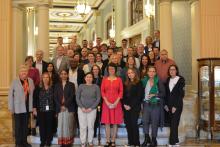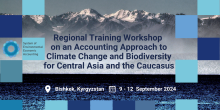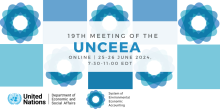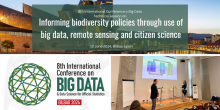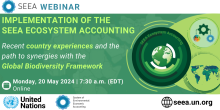The London Group on Environmental Accounting is a city group of the United Nations Statistical Commission established in 1993 to provide a forum for practitioners to share their experience of developing and implementing environmental accounts. Members of the London group are experts primarily from national statistical agencies but also international organizations.
- Accueil ONU
- Events
Events
Upcoming Events
This e-learning course is organized by the UN Statistical Institute for Asia and the Pacific (SIAP) and will run from 30 September to 8 November 2024. More information in the UNSIAP website here: Compiling climate change indicators: an accounting approach | SIAP (unsiap.or.jp)
High quality, consistent data on the environment-economy nexus is needed to inform effective pathways for addressing climate change, biodiversity losses and related issues. National statistical offices (NSOs) in the Central Asia and the Caucasus have expressed strong interest in compiling various SEEA accounts, including taking steps towards compiling energy and air emission accounts which are among the most relevant accounts for informing climate change.
The UN Committee of Experts on Environmental-Economic Accounting (UNCEEA) functions as an umbrella body to provide overall vision, coordination, prioritization and direction in the field of environmental-economic accounting. The UNCEEA meets once a year and is governed by the Bureau of the UNCEEA.
The workshop entitled "ARIES for SEEA" covered essential topics related to the ARIES for SEEA platform. Participants learned about ecosystem extent accounts. Practical exercises and discussions enhanced understanding and provided hands-on experience.
The session entitled "Integrated Modelling for Ecosystem Extent Mapping and Ecosystem Services" aimed to present various initiatives on developing ecosystem extent maps and models for ecosystem services and discussed how these initiatives and tools could be used to support the compilation of SEEA ecosystem accounts and facilitate reporting under the Kunming-Montreal Global Biodiversity Framework (GBF) of the Convention on Biological Diversity (CBD), through focusing on indicators A.2 “Extent of natural ecosystems” and B.1 “Services provided by ecosystems.”
The session entitled "Informing Biodiversity Policies through the Use of Big Data, Remote Sensing, and Citizen Science” was organized as technical session at the 8
As the world grapples with numerous global challenges, including environmental issues, climate change, health crises, food insecurity, economic recovery, and human displacement, the need for knowledge integration has never been more critical. Amid a data landscape with fast-increasing volumes of data, information remains compartmentalised to pre-defined scales and fields, rarely building its way up to collective knowledge.
This webinar is part of the SEEA Webinar series “Uses of the SEEA for Policy, developed with the aim to highlight various priority and/or emerging policy areas that can be informed by the System of Environmental-Economic Accounting (SEEA).
The Secretariat of the Convention on Biological Diversity is convening an information workshop on the work of the Ad Hoc Technical Expert Groups (AHTEGs) on Indicators for the Kunming-Montreal Global Biodiversity Framework, and on Synthetic Biology and Risk Assessment.
This workshops held immediately prior to the twenty-sixth meeting of the Subsidiary Body on Scientific, Technical and Technological Advice (SBBSTTA 26)
Events Calendar
| Sun | Mon | Tue | Wed | Thu | Fri | Sat |
|---|---|---|---|---|---|---|
|
|
|
1 |
2 |
3 |
4 |
5 |
|
6 |
7 |
8 |
9 |
10 |
11 |
12 |
|
13 |
14 |
15 |
16 |
17 |
18 |
19 |
|
20 |
21 |
22 |
23 |
24 |
25 |
26 |
|
27 |
28 |
29 |
30 |
31 |
|
|

